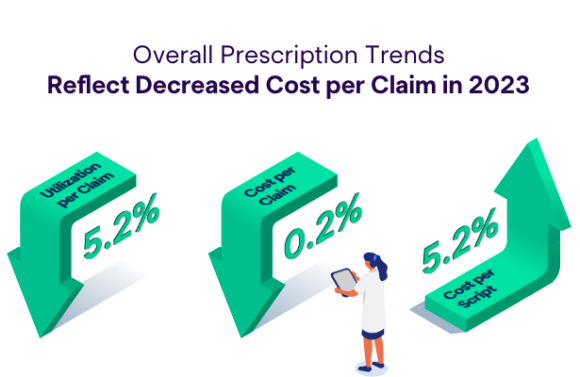Overall opioid utilization is down nearly 10%, and the use of sustained-release opioids dropped by more than 10%, a new report shows.
Authors of the report credit efforts by workers’ comp regulators and professionals to control opioid prescriptions and distribution,
The findings are from Enlyte’s 2024 Annual Pharmacy Solutions Drug Trends Report. Each year Enlyte researchers analyze drug utilization and spending trends in workers’ comp.
Among opioid categories, the report indicates decreases in utilization, including sustained-released opioids, which dropped by more than 10% in 2023, as supported by prescribing guidelines. Enlyte’s data also shows overall opioid usage per claim dropped by nearly 10%, while cost per claim fell by more than 7%.
Researchers also noted per claim drops in overall drug cost and utilization in workers’ comp among therapeutic classes ranked by cost in 2023. While eight of the top 10 therapeutic classes experienced increased costs per prescription, utilization per claim fell in every class except migraine medications (up 17%).
The largest prescription cost increases were within the respiratory and migraine medication classes at 14.7% and 10.2%, and both classes were among the top five therapeutic classes to experience brand average wholesale price increases in 2023.
The data also shows that retail and mail order prescriptions are trending downward with utilization per claim falling by more than 5% and cost per claim down by 0.2%. However, costs per script continue to rise, increasing from last year’s report by 5.2%.
Opioid prescriptions were down but remain at the top. The top six classes, which represent nearly 70% of all prescriptions, were:
- Opioids
- NSAIDs
- Anticonvulsants
- Muscle Relaxants
- Antidepressants, non-TCA
- Topicals
San Diego, California-based Enlyte is the parent company of Mitchell, Genex and Coventry, a provider of cost-containment technology, independent medical exams, provider and specialty networks, case management services, pharmacy benefit and disability management.
Was this article valuable?
Here are more articles you may enjoy.


 AI Claim Assistant Now Taking Auto Damage Claims Calls at Travelers
AI Claim Assistant Now Taking Auto Damage Claims Calls at Travelers  NYC Travel Snarled by Snow as Central Park Gets 15 Inches
NYC Travel Snarled by Snow as Central Park Gets 15 Inches  Asbestos Lawsuits Prompt Vanderbilt Minerals to File Bankruptcy
Asbestos Lawsuits Prompt Vanderbilt Minerals to File Bankruptcy  When the Workplace Is Everywhere: The New Reality of Workers’ Comp Claims
When the Workplace Is Everywhere: The New Reality of Workers’ Comp Claims 